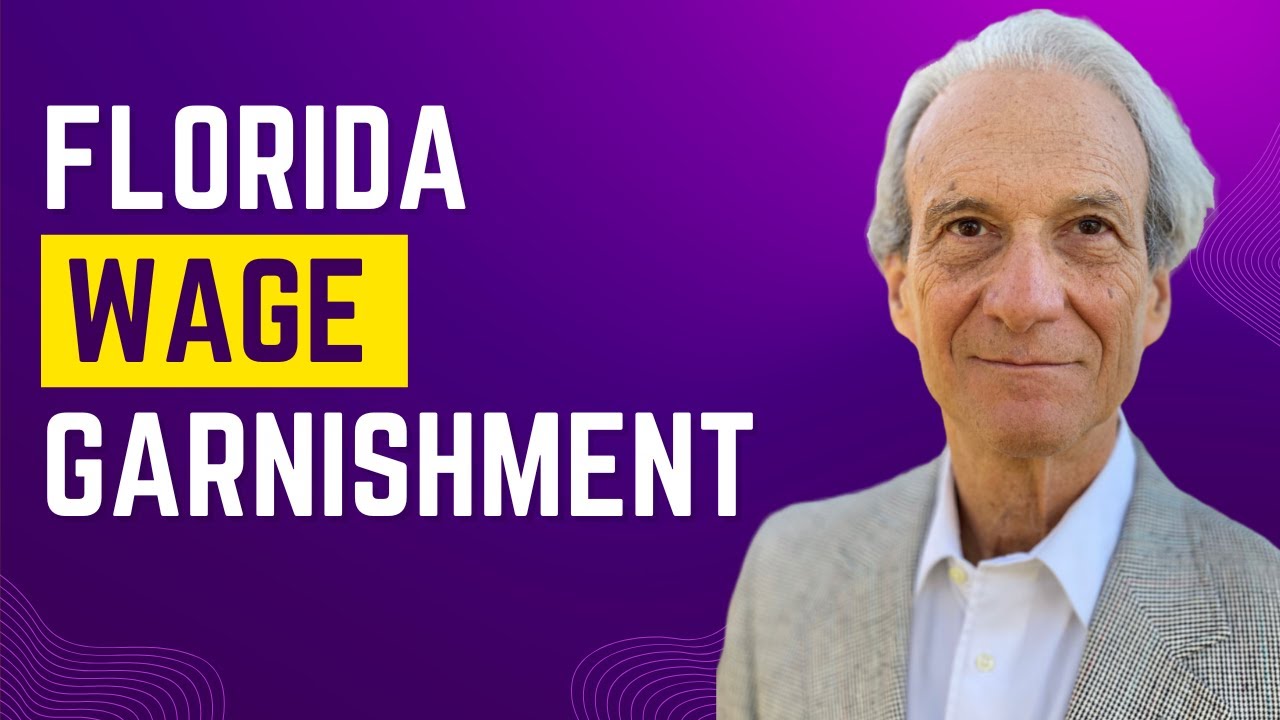Guide to Wage Garnishment in Florida
What Is a Wage Garnishment?
A wage garnishment is a legal process where a creditor can collect a portion of your wages to satisfy a judgment. Florida law provides significant protections for debtors against wage garnishment.
Head of Household Wage Garnishment Exemption
Florida law protects wages for individuals who qualify as the head of household. A head of household is someone who provides more than half of the financial support for a dependent. If you are the head of household, your wages are generally exempt from garnishment unless you agreed in writing to allow garnishment.
You must file an affidavit with the court to claim the head of household exemption. If you fail to timely claim the exemption, the court may allow the creditor to garnish your wages even if you qualify.
The head of household exemption can be applied to salary, hourly wages, bonuses, commissions, and other forms of employee compensation. Payments due to a debtor working as an independent contractor are not subject to continuing wage garnishment.
We help protect what you’ve earned.
Jon Alper and Gideon Alper are nationally recognized experts in asset protection planning and implementation. In over 30 years, we have advised thousands of clients about how to protect their assets from judgment creditors.
We provide all services remotely by phone or Zoom.

Limits on Wage Garnishment Amounts in Florida
Florida law limits the amount a creditor can garnish from your wages. A judgment creditor can take the lesser of 25% of your disposable income or the amount by which your weekly disposable earnings exceed 30 times the federal minimum wage.
“Disposable income” means your earnings after taxes and other legally required deductions. Some debts, such as child support and student loans, have higher garnishment limits.
Wages Deposited in a Bank Account
Florida law allows you to protect wages that have been directly deposited into a bank account. If the deposited wages are exempt from garnishment (such as wages of a head of household), they remain protected if you can trace the source of the deposits.
However, the protection may be lost if wages are commingled with other funds. Keeping deposited wages separate can strengthen your ability to claim the exemption.
How to Stop Wage Garnishment in Florida
If a creditor is attempting to garnish your wages, you may be able to stop the garnishment by:
- Filing a claim of exemption if you qualify as a head of household.
- Challenging procedural defects in the garnishment action.
- Negotiating a settlement with the creditor.
- Filing bankruptcy if other debt relief options are not available.
You have 20 days from the date you receive notice of the garnishment to file your claim of exemption. However, you can negotiate the judgment or file for bankruptcy even after the 20 days has expired.
In Florida, wage garnishment laws are strictly enforced. The garnishment statute requires the creditor to follow specific requirements and procedures, including several required notices and time deadlines. Garnishment procedures are strictly construed, and the creditor must comply with all procedures to enforce continuing wage garnishment in Florida.
Frequently Asked Questions
How much of my wages can be garnished in Florida?
In Florida, a creditor can garnish the lesser of 25% of your disposable earnings or the amount by which your weekly disposable earnings exceed 30 times the federal minimum wage. Disposable earnings are what remains after required deductions such as taxes. Special rules apply for garnishment related to child support, federal student loans, or IRS debts.
How do I stop wage garnishment in Florida?
You can stop a wage garnishment by filing a claim of exemption with the court within 20 days after receiving the garnishment notice. Common exemptions include the head of household exemption, which protects wages for individuals supporting dependents. Negotiating a settlement with the creditor or filing bankruptcy may also stop wage garnishment under certain circumstances.
How long do wage garnishments last in Florida?
In Florida, a wage garnishment lasts until the judgment is fully paid or otherwise resolved. There is no automatic expiration once garnishment begins. However, judgments in Florida are valid for 20 years, meaning a creditor can continue collecting through garnishment or other means until the judgment is satisfied or the 20-year period expires.
Can a creditor garnish wages without going to court in Florida?
No. In Florida, a creditor must first obtain a court judgment before garnishing your wages. After obtaining the judgment, the creditor must file a separate garnishment action and properly notify you. Without following these steps, a creditor cannot legally garnish your wages.
Sign up for the latest information.
Get regular updates from our blog, where we discuss asset protection techniques and answer common questions.










